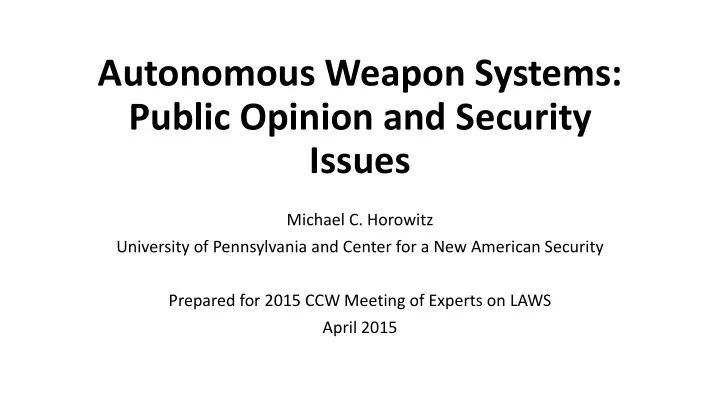

Autonomous Weapon Systems: Public Opinion and Security Issues Michael C. Horowitz University of Pennsylvania and Center for a New American Security Prepared for 2015 CCW Meeting of Experts on LAWS April 2015
How does the general public think about the issue of lethal autonomous weapon systems?
Martens Clause and Public Opinion • What does it mean for a weapon system to violate “the dictates of the public conscience”? • Public opinion is one part of how to evaluate the “public conscience”, though not the only part
The Bar For Claiming That A Weapon System Violates The Dictates Of The Public Conscience Is High • Hard to measure the public conscience • Public opinion is often nuanced and malleable – especially on emerging issues • Implication: Need clear evidence of overwhelming public opposition to be confident LAWS violate public conscience
What Do We Know Right Now About Public Opinion And Autonomous Weapon Systems? • Existing research (Carpenter, Moon et al.) suggests autonomous weapon systems are unpopular and that the public supports a ban, especially in the United States • Is this true? • Their findings depend in part on how they asked the questions
• Survey details: • Sample size • The questions you ask Public • How you ask them Opinion Survey • On new topics where the public lacks knowledge, Methodology providing context is critical to gathering informed Matters opinions • Study: Ask populations in US and India questions about autonomous weapon systems to gauge support/opposition
Test #1a: Ask About A Military Intervention And Whether The US Public Supports Sending LAWS or US Military Personnel • Country: United States • Type of sample: Nationally representative • Date: October 2014 • Sample Size: 1000 • Concept: Respondents asked about a hypothetical military intervention by the United States and whether they would rather the United States use LAWS or US military personnel to intervene
Support Support using human using Question: Do forces, 29% autonomous You Support weapons, Sending LAWS or US military 34% personnel in a hypothetical military intervention? No preference, Public not significantly more opposed 37% to autonomous weapons
Test #1b: Ask About A Military Intervention And Whether The Indian Public Supports Sending LAWS or Indian Military Personnel • Country: India • Type of sample: Convenience (not nationally representative) • Date: April 2015 • Sample Size: 300 • Concept: Respondents asked about a hypothetical military intervention by India and whether they would rather India use LAWS or Indian military personnel to intervene
Support Support Question: Do using using human You Support autonomous forces, 36% Sending LAWS weapons, or Indian 48% military personnel in a hypothetical military No intervention? preference, Public not significantly 16% more opposed to autonomous weapons
Test #2a: Ask US Public About Support For LAWS In A Particular Usage Scenario • Country: United States • Type of sample: Nationally representative • Date: October 2014 • Sample Size: 1000 • Concept: Respondents asked directly about whether they would support the US government developing and using LAWS in a particular context
Strongly Only 13% oppose oppose LAWS in this scenario Somewhat Question: 7% oppose Should the US 6% develop and use LAWS to protect US Neither Strongly ships, planes, support nor support and military oppose 28% bases from 26% attack? Somewhat support 33%
Test #2b: Ask Indian Public About Support For LAWS In A Particular Usage Scenario • Country: India • Type of sample: Convenience (not nationally representative) • Date: April 2015 • Sample Size: 300 • Concept: Respondents asked directly about whether they would support the Indian government developing and using LAWS in a particular context
Somewhat Only 9% oppose Strongly oppose, LAWS in this scenario oppose, Question: 7% 2% Should India Neither develop and support nor use LAWS to oppose, 11% protect Indian Strongly ships, planes, support, 43% and military bases from attack? Somewhat support, 37%
So What Does The Public Really Think About Autonomous Weapon Systems? • Complicated and depends on context : how you ask the questions and who you ask really matters • Bar for claiming that survey results speak for the conscience of humanity should be extremely high • Results demonstrate, at the very least, that it is too soon to say that autonomous weapon systems necessarily violate the “public conscience” provision of the Martens Clause from a public opinion perspective • Next steps: Representative survey samples in other countries
For more i inf nformation, n, i includ uding ng det etails o s on the s survey q questions, ns, met etho hods, ds, o or resul ults, s, c contact M Michael el C. Horowitz a at: Email: il: horom@sas. s.upenn. upenn.edu du Tw Twitter: mchoro rowitz Web: h https://www.sa sas. s.upenn. upenn.edu/ edu/po polisci/peo peopl ple/ e/stand nding ng- facul ulty/michael el-c-horo rowitz
Recommend
More recommend